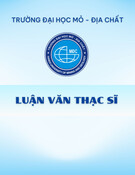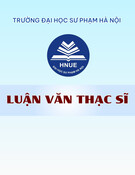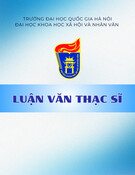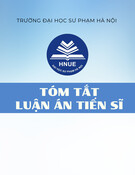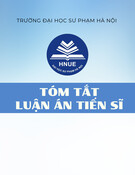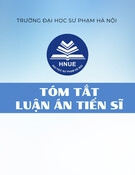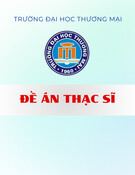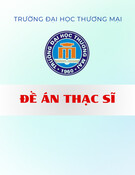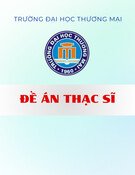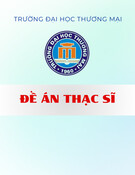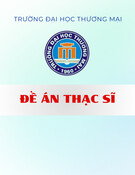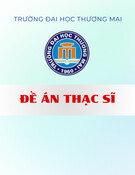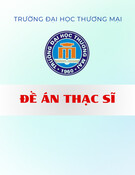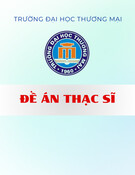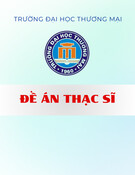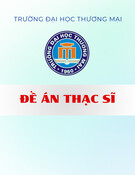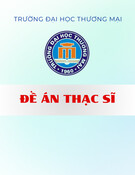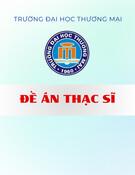
VIETNAM NATIONAL UNIVERSITY, HANOI
UNIVERSITY OF LANGUAGES AND INTERNATIONAL STUDIES
FACULTY OF POST – GRADUATE STUDIES
-----*-----
NGUYỄN THỊ ÁNH NGUYỆT
DIVERSIFICATION OF PRE-LISTENING ACTIVITIES TO
IMPROVE STUDENTS’ LISTENING SKILL: ACTION RESEARCH
AT INDUSTRIAL ECONOMICS TECHNOLOGY COLLEGE
(Đa dạng hóa các hoạt động trước nghe để nâng cao kỹ năng nghe
của sinh viên: nghiên cứu hành động tại trường Cao đẳng Công nghệ
và Kinh tế Công nghiệp.)
M.A. MINOR PROGRAM THESIS
Field : English Teaching Methodology
Code : 8140231.01
HANOI – 2019

VIETNAM NATIONAL UNIVERSITY, HANOI
UNIVERSITY OF LANGUAGES AND INTERNATIONAL STUDIES
FACULTY OF POST – GRADUATE STUDIES
-----*-----
NGUYỄN THỊ ÁNH NGUYỆT
DIVERSIFICATION OF PRE-LISTENING ACTIVITIES TO
IMPROVE STUDENTS’ LISTENING SKILL: ACTION RESEARCH
AT INDUSTRIAL ECONOMICS TECHNOLOGY COLLEGE
(Đa dạng hóa các hoạt động trước nghe để nâng cao kỹ năng nghe
của sinh viên: nghiên cứu hành động tại trường Cao đẳng Công nghệ
và Kinh tế Công nghiệp.)
M.A. MINOR PROGRAM THESIS
Field : English Teaching Methodology
Code : 8140231.01
Supervisor : Assoc. Prof. Dr. LÂM QUANG ĐÔNG
HANOI – 2019

i
ACKNOWLEDGEMENTS
I would like to express my heartfelt gratitude to my supervisor, Assoc.Prof.Dr. Lam
Quang Dong for his patient guidance, stimulating suggestions and encouragement
throughout my research.
I wish to thank all the staff members of the Faculty of Post-Graduate Studies,
University of Languages and International Studies for providing me the best
environment to fulfill my graduate program.
My sincere gratitude also goes to my colleague Mrs. Nguyen Mai Linh. The support
that she gave me truly helped with my progress and completion of the research
project. Especially, I would like to express my special thanks to my family who
offered me their love, care, support and encouragement so that I could accomplish
my study.
Last but not least, I would like to express appreciation to my students in Industrial
Economics Technology College who were very enthusiastic to support me by
participating in the research and providing me with the needed data without which
the study could not have been completed.

ii
ABSTRACT
Although listening skill, one of the four core language competences fostered in
Industrial Economics Technology College (IETC)‟s English curriculum, has always
been promoted, students‟ performance in this aspect of proficiency still remains
low. Through practice, the researcher realized that the main reason for this problem
is the lack of good preparation for students from the pre-listening stage. Therefore,
it is extremely necessary to conduct an action research with the aim of improving
students‟ listening comprehension by diversifying pre-listening activities. In the
study, a pre-test and post-test were employed to check the students‟ listening
comprehension and the questionnaires to gauge students‟ attitudes when the teacher
used varied pre-listening activities. The findings of this study suggest that students‟
listening skill was much boosted after they were exposed to various pre-listening
activities. The results also showed that the students had improved attitudes towards
learning listening skill after the introduction of varied pre-listening activities.
Hopefully, the thesis can be considered a practical contribution to more effective
teaching practices at IETC and the ongoing process of renovation for teaching and
learning listening.

iii
TABLE OF CONTENTS
ACKNOWLEDGEMENTS ...................................................................................... i
ABSTRACT .............................................................................................................. ii
LIST OF TABLES .................................................................................................... i
LIST OF FIGURES ................................................................................................. ii
CHAPTER 1: INTRODUCTION ............................................................................ 1
1.1. Rationale of the study........................................................................................... 1
1.2. Aims and scope of the study ................................................................................ 3
1.2.1. Research Aims .................................................................................................. 3
1.2.2. Scope of the study ............................................................................................. 3
1.3. Research questions ............................................................................................... 4
1.4. Summary of Chapter 1 ......................................................................................... 4
CHAPTER 2: LITERATURE REVIEW ................................................................ 5
2.1. Theoretical background of listening skill ............................................................. 5
2.1.1. A brief overview of listening ............................................................................ 5
2.1.2. Listening comprehension in language learning and teaching process .............. 6
2.2. Factors affecting students‟ listening comprehension ........................................... 7
2.2.1 Unfamiliar topics ................................................................................................ 7
2.2.2. Cultural Differences .......................................................................................... 8
2.2.3. Pronunciation, stress, rhythm and intonation .................................................... 8
2.2.4 Listeners‟ limited vocabularies .......................................................................... 9
2.2.5 Length and Speed of Listening .......................................................................... 9
2.2.6 Inability to concentrate ....................................................................................... 9
2.3. Listening Comprehension in EFL Classrooms .................................................... 9
2.3.1 Pre-listening stage .............................................................................................. 9
2.3.2. While-listening stage and post-listening stage ................................................ 10
2.3.3 The roles of pre-listening activities .................................................................. 11
2.3.4 Pre-listening activities ...................................................................................... 12

